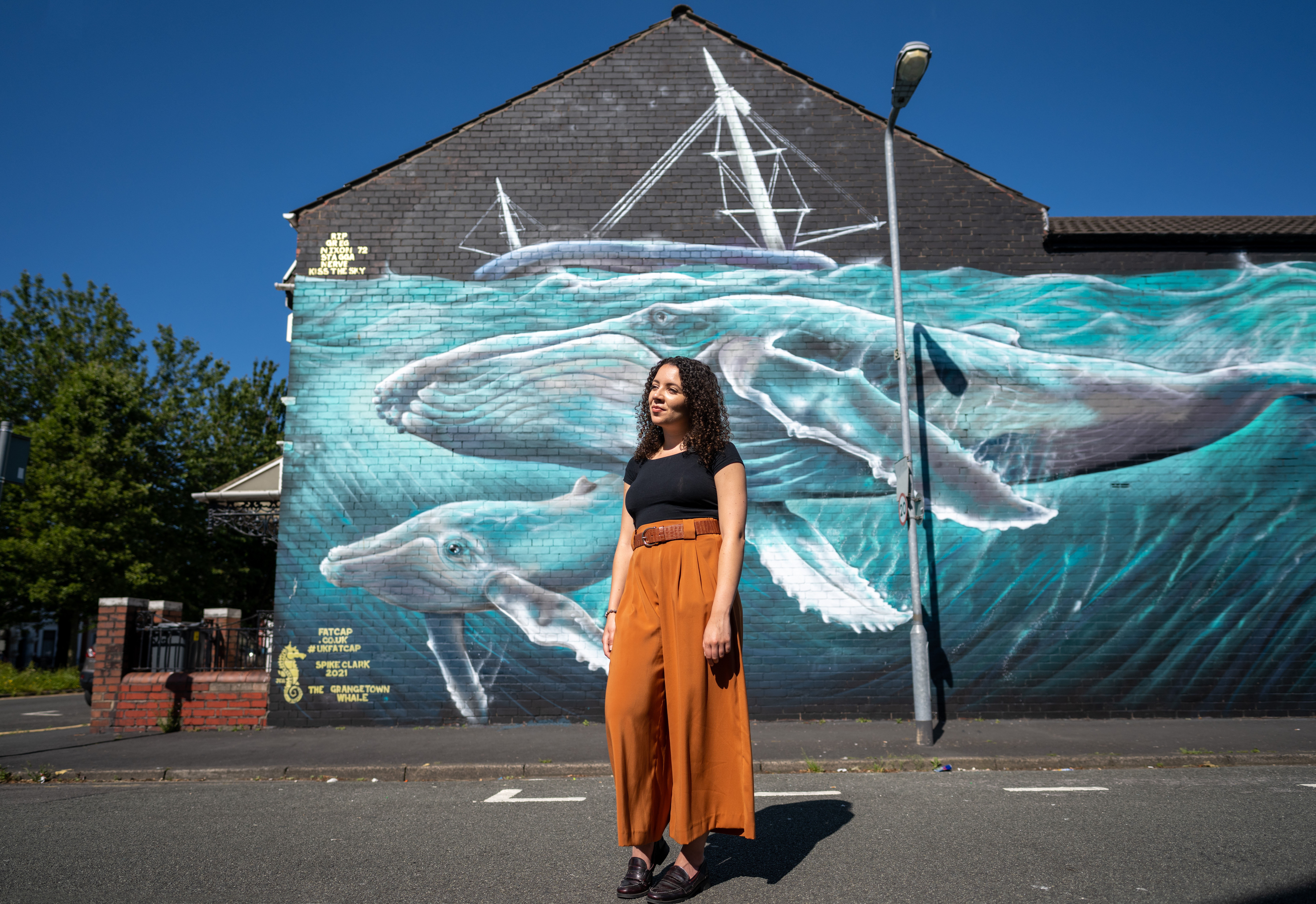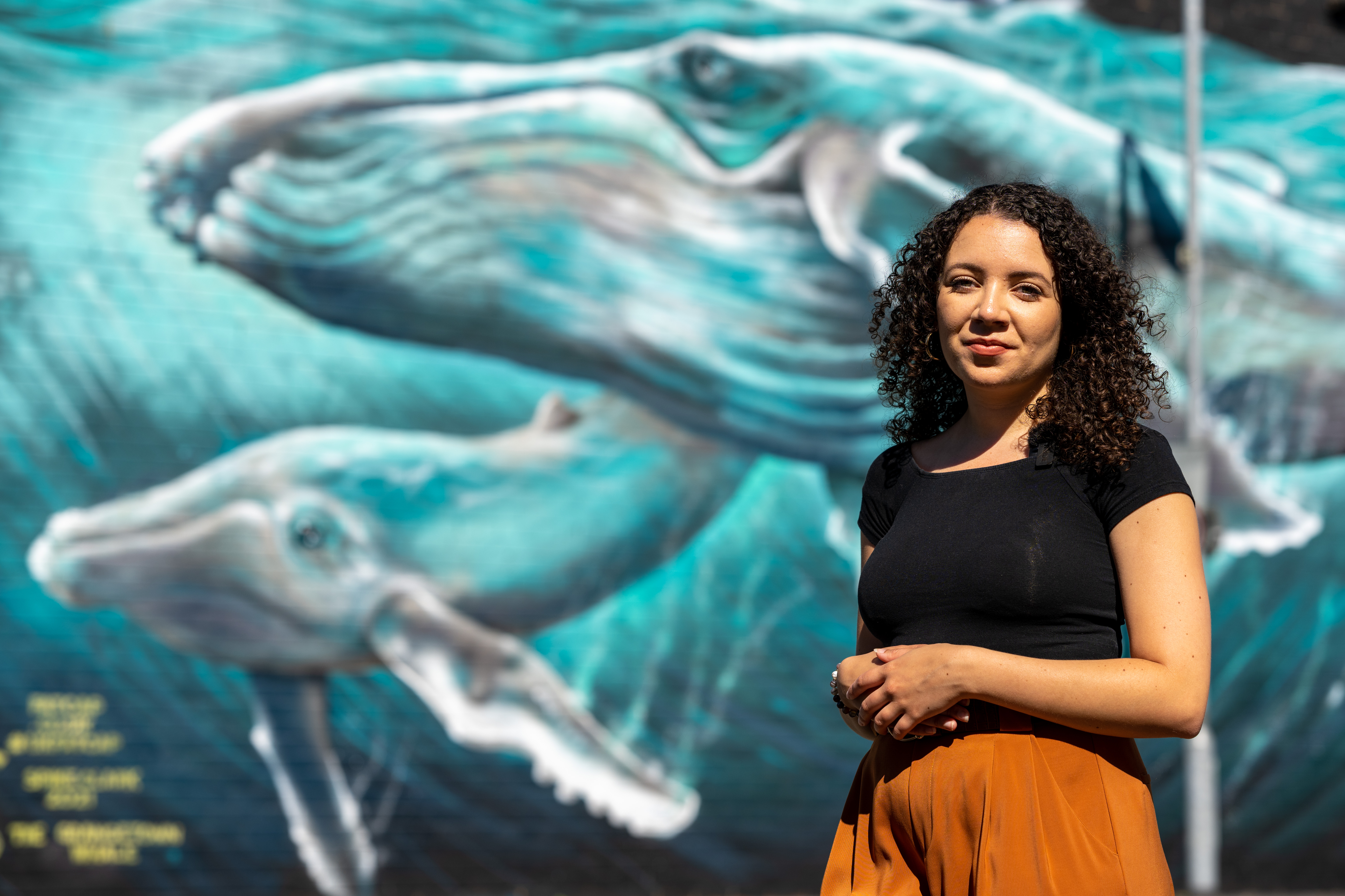Climate change threat to our homes explored by Future Generations Commissioner’s poet in residence, Taylor Edmonds, with new poem commissioned by free event, Everything Change
17/6/21
‘the leaders, the people, they rolled over like spent dogs, yawned above the warnings’
Scientists have warned our communities could be underwater in the near future unless drastic action is taken on climate change, and a Welsh poet has described what that could look like.
Taylor Edmonds, the Poet in Residence for the Future Generations Commissioner for Wales, has imagined a future where the places we live are lost forever, for a new series of free online events, Everything Change, exploring the roles of creativity and adaptive thinking in tackling the climate emergency.
The 26-year-old was recruited to the post in April to communicate Wales’ Well-being of Future Generations Act and the duty it puts on those in power to protect people not yet born.
Passed in 2015, the law requires decision-makers including Welsh Government, to use more joined-up thinking to prevent problems like climate change and inequality in the long-term.
Taylor, who was born and raised in seaside town Barry, penned My Magnolia Tree after learning more about the risks of rising sea levels if huge cuts are not made to our carbon emissions.

The climate is changing because of emissions of greenhouse gases resulting from human activity; since the late 19th century, the global average temperature has risen by 1.1°C and the global sea level has risen by about 20 cm.
In Fairbourne, Gwynedd, plans are being prepared to relocate 700 people and dismantle the entire village, as flooding and storm surges are predicted to make it uninhabitable. Gwynedd Council said it is working with Welsh Government, Natural Resources Wales and Dŵr Cymru to identify a long-term plan. In addition, a map by Climate Central suggests that some areas across Wales, including Swansea, Llanelli, Aberystwyth, Rhyl and Cardiff, could be under water by 2050 if decisive action is not taken on climate change.
On Wednesday (16/6/20) government advisers said Wales needs to do more to prepare for a hotter, wetter future, to protect people, infrastructure and wildlife. The Climate Change Committee warned thousands more properties could be at risk from coastal flooding by the 2080s (more than 10,000 are currently at risk and the CCC say that could increase to 36,000.)
Taylor’s poem sees its narrator in the future, grappling with sandbags used to protect against floods, as they lament how the places walked by their great-grandparents no longer exist.
“We all know about the imminent threats of climate change and how it’s already impacting people who are having to leave their homes due to extreme weather. I wanted to explore what this might look like closer to home and its impact on generations of a family,” said Taylor, who now lives in Penarth.
“I was lucky to know some of my great-grandparents, who came from Wales, Scotland and Barbados, and I’ve been able to hear their stories, grow familiar with some of the places that were special to them.
“I started to think about how I’d feel if I wasn’t able to visit those precious places in the future – what if all we had left were stories?
“Poetry and art have the power to humanise stories and provoke empathy in ways reports and statistics don’t. Poetry grabs you, makes you listen, gives ideas depth and makes you see yourself and your stake in things.”

The poem sees the narrator dream about following their great-grandmother’s memories through Cardiff, its back streets and picking wild garlic in Bute Park.
With echoes of the story of Cantre’r Gwaelod, it issues a prophetic warning, in which readers will hear a call-to action: ‘the leaders, the people, they rolled over like spent dogs, yawned above the warnings’, as the narrator regrets that they will ‘never re-live her firsts, never see the garden where she planted magnolia,’ before describing the future Welsh capital as ‘an underwater city … a skeleton… a shipwreck’.
Taylor will perform the poem this Saturday at Everything Change, a free online event produced by Taliesin Arts Centre and Swansea University professor in Creativity, Owen Sheers. Future Generations Commissioner, Sophie Howe will also appear.
The programme of ‘discussion, creativity and new ideas’, will discuss the value of interdisciplinary creative thinking across the arts, sciences, law, business, policy and activism in taking meaningful action on the climate crisis. The series of interdisciplinary conversations explore seven crucial areas of change; Money, Food, Water, Energy, Justice, Story, and Change itself.
Wales declared a climate emergency in 2019 and is the only country in the world with a Well-being of Future Generations Act – the first legislation globally to enshrine the rights of future generations alongside current generations.
The Act sets out seven goals including a Wales of vibrant culture and thriving Welsh language, which requires public bodies to work together to promote and protect culture, heritage and the Welsh language, encouraging people to participate in the arts.
Ms Howe is the first Future Generations Commissioner and her interventions have led to Welsh Government scrapping plans for a £1.4bn motorway through a nature reserve, in place of a new transport strategy that prioritises public transport and active travel, a freelancers’ pledge to support creatives while linking them with public bodies to co-create public services, and a commitment by the First Minister to a basic income pilot.
In May, Welsh Government announced a new Climate Change Ministry, covering cross-cutting sectors which influence climate change – housing, transport, planning, environment and energy.
Ms Howe said culture had a huge role to play in communicating the realities of climate change to inspire people to demand more from politicians.
“In Wales, our industrial heritage contributed to the climate change that’s now making people all over the world climate refugees, and it’s important that we talk about that and demand solutions from people in power,” she said.
“The stories we tell about the future we want for Wales and the world are incredibly powerful and poetry can bring to life the challenge with the urgency, and hope, that’s required.
“The Welsh Government has shown ambition on climate action, from the Well-being of Future Generations Act which requires we’re a globally responsible nation, to now, a new Climate Change Ministry. Taylor’s warning reminds us just how crucial it is that we see continued deeds and not just promises.”
Notes to editors
Everything Change is produced by Taliesin Arts Centre (Swansea, Wales) and Swansea University Prof. In Creativity Owen Sheers in partnership with Dhaka Lit Fest (Dhaka, Bangladesh) and with support from the British Council.
It was opened by two-time Booker Prize winner Margaret Atwood and the programme features a line-up including youth activist Dr Mya-Rose Craig, and world-leading scientist, Dr Saleemul Huq.
The Future Generations Commissioner for Wales, Sophie Howe, will appear as part of the event, Change, at 12pm on Saturday, June 19.
Taylor Edmonds will be in conversation with poet, co-curator and professor in Creativity at Swansea University, Owen Sheers at 7pm on June 19, alongside poet laureate Simon Armitage.
Professor Owen Sheers, said: ‘The history of our inaction on climate change is the story of a failure of narrative on the level of a species. We urgently need to recalibrate how we talk about, imagine and tell stories about our relationships with nature, future generations and the way we live now.
‘I’m incredibly excited by the minds and voices we’re bringing together and by how these events might contribute to our imagining and making happen a better, brighter future for all.’
Also part of the programme is the Everything Change Writers’ Lab, one of the British Council’s ‘Creative Commissions for the Climate’. In partnership with Dhaka Lit Fest, the lab will provide a platform for six writing talents from Wales and Bangladesh to create new narratives in response to the climate crisis. The writers’ commissioned works across poetry, fiction and drama will be showcased at Dhaka Lit Fest in January 2022.
Taylor Edmonds is the Future Generations Commissioner’s second poet-in-residence, in collaboration with Literature Wales and Wales Arts International, after Rufus Mufasa completed her post in 2019.
You can find tips for taking climate action in Wales at Friends of the Earth Cymru.
My Magnolia Tree
by Taylor Edmonds, Poet in Residence for the Future Generations Commissioner for Wales.
(For Everything Change.)